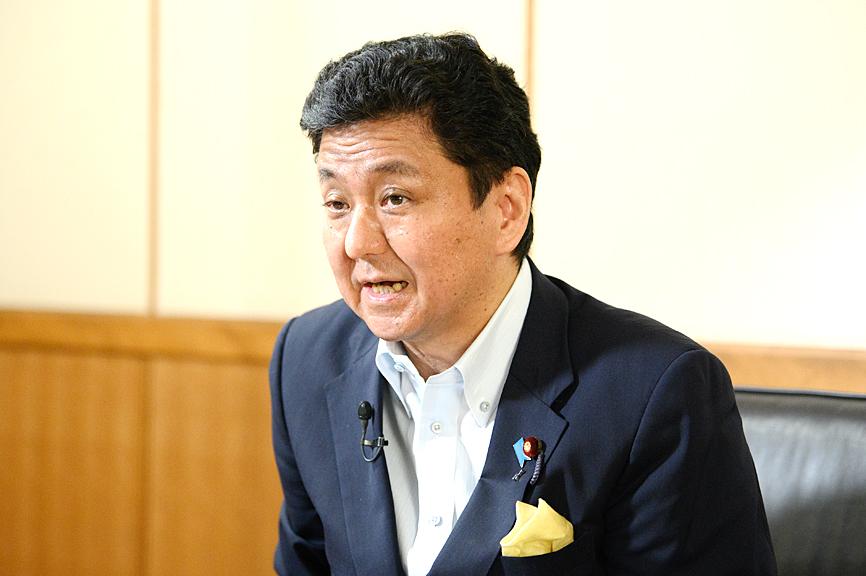The security of Taiwan is directly linked with that of Japan, Japanese Minister of Defense Nobuo Kishi said on Thursday, as tensions around Taiwan build up and its defenses are increasingly overshadowed by China’s military might.
The comments from a Cabinet minister known for his close ties to Taipei came a week after China sent 28 warplanes near Taiwan, in the latest ratcheting up of military pressure around the nation, 110km from Japan at its nearest point.
“The peace and stability of Taiwan are directly connected to Japan, and we are closely monitoring ties between China and Taiwan, as well as Chinese military activity,” Kishi said in an interview.

Photo: Bloomberg
“As China strengthens its military, its balance with Taiwan is tipping heavily to the Chinese side,” he said, adding that the gap is widening every year.
Taiwan is crucial for Tokyo, with the Luzon Strait to the south of Japan an important shipping lane for the energy tankers that resource-poor Japan relies on to power its economy.
On April 17, Kishi visited Yonaguni, the nearest Japanese island to Taiwan, and the Fuji News Network reported him as saying days later at a ruling party seminar that if Taiwan “turns red,” the situation might change drastically, and Japan needs to be ready for that.
The Chinese Ministry of Foreign Affairs called the comments reckless and irresponsible.
The younger brother of former Japanese prime minister Shinzo Abe, Kishi was among a group of lawmakers who visited Taipei last year to convey condolences over the death of former president Lee Teng-hui (李登輝).
Taiwan has become an increasingly important topic for the US and its allies, many of whom are concerned about China’s growing assertiveness near the country, whose semiconductor industry has become a linchpin of the global supply chain.
Japanese Prime Minister Yoshihide Suga and US President Joe Biden emphasized the importance of reducing tensions in the Taiwan Strait following their April summit, the first mention of the issue in a joint statement since 1969.
In the same statement, Japan, whose pacifist constitution leaves it heavily dependent on the US for its “nuclear umbrella,” vowed to bolster its own defense capabilities.
In other news, Japanese Minister of Foreign Affairs Toshimitsu Motegi yesterday said that Japan would soon give Taiwan a second donation of 1 million doses of the AstraZeneca COVID-19 vaccine.
The vaccines would arrive by the middle of next month, Motegi told a news conference, three weeks after Japan donated 1.24 million doses to Taiwan.
The donations are a gesture of gratitude for Taiwan’s aid to Japan in the aftermath of a devastating earthquake and tsunami that hit Japan in 2011, Motegi said.
The Ministry of Foreign Affairs in Taipei issued a statement, thanking Japan for its generosity.
Additional reporting by CNA

CHAOS: Iranians took to the streets playing celebratory music after reports of Khamenei’s death on Saturday, while mourners also gathered in Tehran yesterday Iranian Supreme Leader Ayatollah Ali Khamenei was killed in a major attack on Iran launched by Israel and the US, throwing the future of the Islamic republic into doubt and raising the risk of regional instability. Iranian state television and the state-run IRNA news agency announced the 86-year-old’s death early yesterday. US President Donald Trump said it gave Iranians their “greatest chance” to “take back” their country. The announcements came after a joint US and Israeli aerial bombardment that targeted Iranian military and governmental sites. Trump said the “heavy and pinpoint bombing” would continue through the week or as long

TRUST: The KMT said it respected the US’ timing and considerations, and hoped it would continue to honor its commitments to helping Taiwan bolster its defenses and deterrence US President Donald Trump is delaying a multibillion-dollar arms sale to Taiwan to ensure his visit to Beijing is successful, a New York Times report said. The weapons sales package has stalled in the US Department of State, the report said, citing US officials it did not identify. The White House has told agencies not to push forward ahead of Trump’s meeting with Chinese President Xi Jinping (習近平), it said. The two last month held a phone call to discuss trade and geopolitical flashpoints ahead of the summit. Xi raised the Taiwan issue and urged the US to handle arms sales to

BIG SPENDERS: Foreign investors bought the most Taiwan equities since 2005, signaling confidence that an AI boom would continue to benefit chipmakers Taiwan Semiconductor Manufacturing Co’s (TSMC, 台積電) market capitalization swelled to US$2 trillion for the first time following a 4.25 percent rally in its American depositary receipts (ADR) overnight, putting the world’s biggest contract chipmaker sixth on the list of the world’s biggest companies by market capitalization, just behind Amazon.com Inc. The site CompaniesMarketcap.com ranked TSMC ahead of Saudi Aramco and Meta Platforms Inc. The Taiwanese company’s ADRs on Tuesday surged to US$385.75 on the New York Stock Exchange, as strong demand for artificial intelligence (AI) applications led to chip supply constraints and boost revenue growth to record-breaking levels. Each TSMC ADR represents

State-run CPC Corp, Taiwan (CPC, 台灣中油) yesterday said that it had confirmed on Saturday night with its liquefied natural gas (LNG) and crude oil suppliers that shipments are proceeding as scheduled and that domestic supplies remain unaffected. The CPC yesterday announced the gasoline and diesel prices will rise by NT$0.2 and NT$0.4 per liter, respectively, starting Monday, citing Middle East tensions and blizzards in the eastern United States. CPC also iterated it has been reducing the proportion of crude oil imports from the Middle East and diversifying its supply sources in the past few years in response to geopolitical risks, expanding